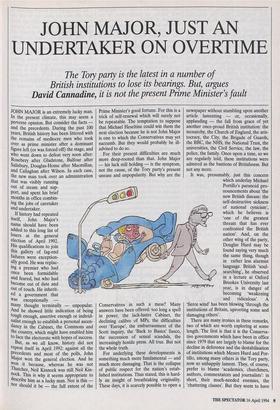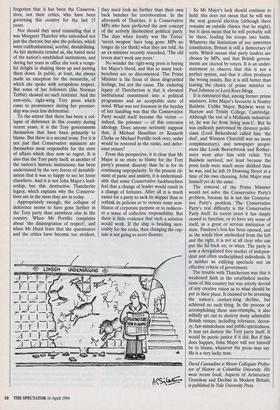JOHN MAJOR, JUST AN UNDERTAKER ON OVERTIME
The Too, party is the latest in a number of
British institutions to lose its bearings. But, argues
David Cannadine, it is not the present Prime Minister's fault
JOHN MAJOR is an extremely lucky man. In the present climate, this may seem a perverse opinion. But consider the facts and the precedents. During the past 100 years, British history has been littered with the remains of mediocre men who took over as prime minister after a dominant figure left (or was forced off) the stage, and who went down to defeat very soon after: Rosebery after Gladstone, Balfour after Salisbury, Douglas-Home after Macmillan, and Callaghan after Wilson. In each case, the new man took over an administration that was visibly running out of steam and sup- port, and spent his brief months in office combin- ing the jobs of caretaker and undertaker.
If history had repeated itself, John Major's name should have been added to this long list of losers at the general election of April 1992.
His qualifications to join this gallery of fag-end
failures were exception- ally good. He was replac- ing a premier who had once been formidable and feared, but who had become out of date and out of touch. He inherit- ed a government that was exceptionally - many thought terminally — unpopular. And he showed little indication of being tough enough, assertive enough or individ- ualist enough to establish a personal ascen- dancy in the Cabinet, the Commons and the country, which might have enabled him to face the electorate with hopes of success. But, as we all know, history did not repeat itself in April 1992: against all the precedents and most of the polls, John Major won the general election. And he Won it because, whereas he was not Thatcher, Neil Kinnock was still Neil Kin- nock. This is why it seems appropriate to describe him as a lucky man. Nor is this nor should it be — the full extent of the Prime Minister's good fortune. For this is a trick of self-renewal which will surely not be repeatable. The temptation to suppose that Michael Heseltine could win them the next election because he is not John Major is one to which the Conservatives may yet succumb. But they would probably be ill- advised to do so.
For their present difficulties are much more deep-rooted than that. John Major — his luck still holding — is the symptom, not the cause, of the Tory party's present unease and unpopularity. But why are the Conservatives in such a mess? Many answers have been offered: too long a spell in power, the lack-lustre Cabinet, the declining calibre of MPs, the difficulties over 'Europe', the embarrassment of the Scott inquiry, the 'Back to Basics' fiasco, the succession of sexual scandals, the increasingly hostile press. All true. But not the whole truth.
For underlying these developments is something much more fundamental — and much more damaging. That is the collapse of public respect for the nation's estab- lished institutions. Thus stated, this is hard- ly an insight of breathtaking originality. These days, it is scarcely possible to open a newspaper without stumbling upon another article lamenting — or, occasionally, applauding — the fall from grace of yet another once-proud British institution: the monarchy, the Church of England, the aris- tocracy, the City, the Brigade of Guards, the BBC, the NHS, the National Trust, the universities, the Civil Service, the law, the police, the family. Once upon a time, so we are regularly told, these institutions were admired as the bastions of Britishness. But not any more.
It was, presumably, just this concern which underlay Michael Portillo's paranoid pro- nouncements about `the new British disease: the self-destructive sickness of national cynicism', which he believes is `one of the greatest threats that has ever confronted the British nation'. And, on the other wing of the party, Douglas Hurd may be found saying very much the same thing, though in rather less alarmist language. British 'soul- searching', he observed in a lecture at Oxford Brookes University last year, is in danger of becoming 'weakening and ridiculous'. A `fierce wind' has been blowing 'through the institutions of Britain, uprooting some and damaging others'.
There are many ironies in these remarks, two of which are worth exploring at some length. The first is that it is the Conserva- tive governments which have been in office since 1979 that are largely to blame for the decline in deference and the destabilisation of institutions which Messrs Hurd and Por- tillo, among many others in the Tory party, now so unhappily lament. They, of course, prefer to blame 'academics, churchmen, authors, commentators and journalists': in short, their much-needed enemies, the `chattering classes'. But they seem to have forgotten that it has been the Conserva- tives, not their critics, who have been governing this country for the last 15 years.
Nor should they need reminding that it was Margaret Thatcher who unleashed not just the rhetoric but also the policies, which were confrontational, acerbic, destabilising. As her memoirs remind us, she hated most of the nation's established institutions, and during her years in office she took a venge- ful delight in shaking them up and putting them down. In public, at least, she always made an exception for the monarchy, of which she spoke with scrupulous respect. But some of her followers (like Norman Tebbit) showed no such restraint. And the new-style, right-wing Tory press which came to prominence during her premier- ship was even less deferential.
To the extent that there has been a col- lapse of deference in this country during recent years, it is the Tory governments themselves that have been primarily to blame. But there is a second irony. For it is not just that Conservative ministers are themselves most responsible for the state of affairs which they now so regret. It is also that the Tory party itself, as another of the nation's historic institutions, has been undermined by the very forces of destabili- sation that it was so happy to see let loose elsewhere. And it is not John Major's lead- ership, but this destructive Thatcherite legacy, which explains why the Conserva- tives are in the mess they are in today.
Appropriately enough, the collapse of deference seems to have gone further in the Tory party than anywhere else in the country. When Mr Portillo complains about 'the disintegration of respect', and when Mr Hurd fears that the questioners and the critics have become too strident, they need look no further than their own back benches for corroboration. In the aftermath of Thatcher, it is Conservative MPs who have perfected the new concept of the actively disobedient political party. The days when loyalty was the Tories' `secret weapon' have long gone. MPs no longer do (or think) what they are told. As an ex-minister recently remarked, 'The old levers don't work any more.'
No wonder the right-wing press is baying for Major's blood, and that so many back- benchers are so discontented. The Prime Minister is the focus of these disgruntled feelings, but not the cause. The enduring legacy of Thatcherism is that it elevated institutional resentment into a political programme and an acceptable state of mind. What was not foreseen in the heyday of her handbag was that the Conservative Party would itself become the victim indeed, the prisoner — of this corrosive ideology. Does anyone seriously suppose that, if Michael Heseltine or Kenneth Clarke or Michael Portillo took over, order would be restored in the ranks, and defer- ence return?
From this perspective, it is clear that Mr Major is no more to blame for the Tory party's present disarray than he is for its continuing unpopularity. In the present cli- mate of panic and anxiety, it is understand- able that some Conservative backbenchers feel that a change of leader would result in a change of fortunes. After all it is much easier for a party to sack its skipper than to rethink its policies or to restore some sem- blance of corporate purpose or to,rediscov- er a sense of collective responsibility. But there is little evidence that such a solution would work, If the ship is heading inex- orably for the rocks, then changing the cap- tain is not going to avert disaster. So Mr Major's luck should continue to hold: this does not mean that he will win the next general election (although there remains an outside chance that he might), but it does mean that he will probably still be there, leading his troops into battle.
Whatever the limitations of our unwritten constitution, Britain is still a democracy of sorts. Which means that party leaders are chosen by MPs, and that British govern- ments are elected by voters. It is an under- statement to observe that this is not a perfect system, and that it often produces the wrong results. But it is still better than leaving the choice of prime minister to Paul Johnson or Lord Rees-Mogg.
It is rumoured that, among former prime ministers, John Major's favourite is Stanley Baldwin. Unlike Major, Baldwin went to Harrow and Trinity College, Cambridge. Although the son of a Midlands industrial- ist, he was far from being non-U. But he was endlessly patronised by cleverer politi- cians (Lord Birkenhead called him 'the dud', and Winston Churchill was no more complimentary), and newspaper propri- etors like Lords Beaverbrook and Rother- mere went after him with relish. Yet Baldwin survived, not least because the press lords were much more disliked than he was, and he left 10 Downing Street at a time of his own choosing. John Major may himself yet do the same.
The removal of the Prime Minister would not solve the Conservative Party's problem, because he is not the Conserva- tive Party's problem. The Conservative Party's real difficulty is the Conservative Party itself. In recent years it has simply ceased to function, or to have any sense of itself, as a great or serious institution of state. Pandora's box has been opened, and as the winds blow unchecked from the left and the right, it is not at all clear who can put the lid back on, or when. The party is now a deregulated free market of indepen- dent and often undisciplined individuals. It is neither an edifying spectacle nor an effective vehicle of government.
The trouble with Thatcherism was that it weakened faith in the established institu- tions of this country but was utterly devoid of any creative vision as to what should be put in their place. It claimed to be arresting the nation's century-long decline, but achieved no such thing. In the process of accomplishing these non-triumphs, it also wilfully set out to destroy many admirable British virtues, including tolerance, decen- cy, fair-mindedness and public-spiritedness.
It may yet destroy the Tory party itself. It would be poetic justice if it did. But if this does happen, John Major will not himself be to blame, whatever the press may say. He is a very lucky man.
David Cannadine is Moore Collegiate Profes- sor of History at Columbia University. His most recent book Aspects of Aristocracy: Grandeur and Decline in Modern Britain, is published by Yale University Press.



























































 Previous page
Previous page